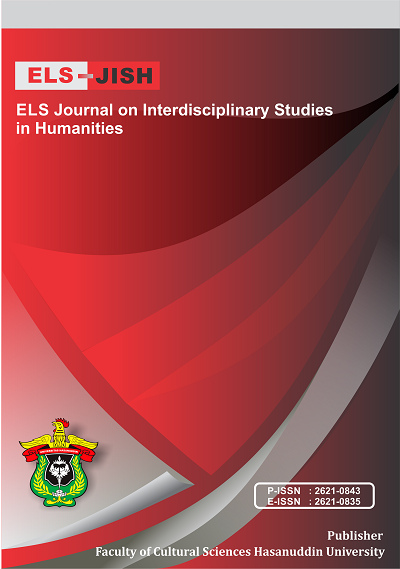Singing Formula of Kelong Jaga (Kajang Oral Tradition)
DOI:
https://doi.org/10.34050/elsjish.v5i4.24835Keywords:
Kajang Community, Kelong Jaga, Oral Tradition, Singing FormulaAbstract
This study focuses on the formula of Kelong Jaga. This study used a descriptive qualitative method in which data were the lyrics of Kelong Jaga then analyzed based on theory of Lord (1981). The result shows that singers of Kelong Jaga use ready common repeated pattern from tradition but in some certain part they usually have to improvise the lyric. The way of learning of Kelong Jaga starts from listening the performance in every opportunity, then practicing in leisure time, and finally trying to get the opportunity to perform in front of the real audience. The formula is distinguished in some parts, namely line analysis, parallel sense, and filler occurred in the Kelong Jaga. It is involved by some ideas that generally mean having good attitude to others, as a guest and as a host. It is involved some ideas namely, 1) Respecting ada’; 2) Party or feast; 3) Telling story about a single girl; 4) Unity and kinship; 5) Giving the best service to the guest; 6) Acting the best attitude to the host; and 7) Keeping earth or environment. It is suggested to youth to learn and perpetuate kelong jaga as oral tradition in Kajang community, thus extinction threat could be avoided.
Keywords: Singing formula, Kelong Jaga, oral tradition, Kajang community.
References
Finnegan, Ruth. (1992). Oral Traditions and The Verbal Arts. London and New York: Routledge.
Lord, Albert Bates. (1981). The Singer of Tales. Cambridge: Harvard University Press.
Laya, Rachmi. (2019). Schematic Composition in Tuja’iMolo’opu: Official Reception Ceremony in Gorontalo. Journal of Arts and Humanities, 07 (07), 01-11.
Maruf, N., Arafah B., Machmoed, H., & Makka, M. (2017). The Concept of Forest in Pasang ri Kajang: A Conceptual Metaphor Analysis. International Journal of Science and Research (IJSR), 6 (11), 1724-1729.
Sahib, Harlinah. (2017). Extextualization and Genre Transformation of Kajang Death Ritual Speech. English Language Studies, Postgraduate Program of Hasanuddin University.
Sambu, Abdul Haris. (2016). Sejarah Kajang (History of Kajang). Lentera: South Sulawesi.
Murti, F.N. (2019). 'Indonesia's Green Literature: 'The Sleeping Beauty' Literary, IOP Conference Series: Earth and Environment Science, 243. 012165 IOP Publishing doi:10.1088/1755-1315/243/1/012165.
Arafah, B., Thayyib, M., Kaharuddin, & Sahib, H. (2020). An Anthropological Linguistic Study on Maccera’ Bulung Ritual, Opción, 36 (27), 1592-1606.
Arafah, B., Abbas, H., & Hikmah, Nurul. (2021). Saving the Environment: Environmental Lessons in Colin Thiele’s February Dragon. Journal of Language Teaching and Research, 12 (6), pp. 935-941. DOI: https://doi.org/10.17507/jltr.1206.09
Irmawati, I., Arafah, B., & Abbas, Herawaty. (2020). The Lesson Life of Santiago as Main Character in Coelho’s The Alchemist. Jurnal Ilmu Budaya, 8 (1), 32-36.
Özdemir, O. (2006). The Effects of Literature on The Sensibility Towards The Environment and Its Value in The Environmental Education System. Eurasian Journal of Educational Research, 23, 159-167.
Arafah, B & Kaharuddin. (2019). The Idol: A Model for Incorporating Literature in ELT. Kn Social Sciencies, 45-59.
Rahman, F., Akhmar, A. M., & Amir, M. (2019). The Practice of Local Wisdom of Kajang People to Save Forests and Biodiversity: A Cultural-Based Analysis. In IOP Conference Series: Earth and Environmental Science, 270 (1), p. 012038). IOP Publishing.
Sahib, H., Rahman, F., Duli, A., & Asba, A. R. (2019). Customary Forest Conservation through Informal Knowledge System of Ammatowa Community. In IOP Conference Series: Earth and Environmental Science, 270 (1), p. 012042). IOP Publishing.
Sandler, R. (2012). Environmental Ethics, Overview, in Chadwick, R. (ed.) Encyclopedia of Applied Ethics (Second Edition). London, United Kingdom: Academic Press, 105-113.
Weda, S., Rahman, F., Atmowardoyo, H., Samad, I. A., Fitriani, S. S., Said, M. M., & Sakti, A. E. F. (2022). Intercultural Communicative Competence of Students from Different Cultures in EFL Classroom Interaction
Downloads
Published
How to Cite
Issue
Section
License
Copyright (c) 2022 A. Tenrinia Asmanur

This work is licensed under a Creative Commons Attribution-NonCommercial-ShareAlike 4.0 International License.






